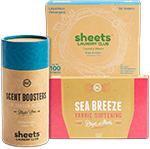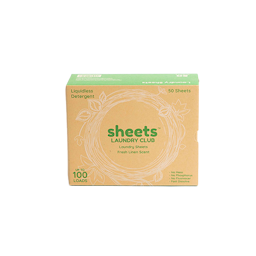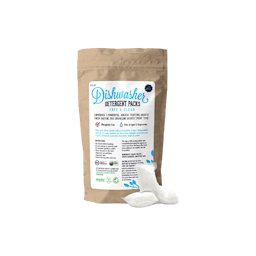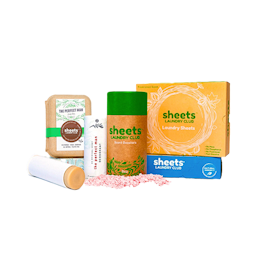Can Laundry Pods Clog Pipes?
Doing the laundry can be a time-consuming task, so it’s understandable if you want to simplify the process. Laundry pods might sound like the ideal solution but it’s worth doing a little research before you make the switch. When not used properly, laundry pods could lead to problems for your plumbing.
To help you understand the risks, we’re going to uncover the details about laundry pods, how they work, and what can go wrong when using them. But we’re not here to scare you—we want to help you find a safe and smart solution.
So, we’ll also tell you what we recommend as an alternative to laundry pods. Let’s get started!
What Are Laundry Pods and How Do They Work?
The key to a clean and fresh-smelling load of laundry is all about the detergent. While traditional options like liquids and powders can be messy and hard to measure, laundry pods promise simplicity and precision. But they might not be everything they claim to be.
A laundry pod is a single-use packet of concentrated detergent, typically wrapped in a film that dissolves in water. As the film dissolves, the detergent and other cleaning agents are released into the water where they get to work washing your clothes.
Unfortunately, laundry pods aren’t always predictable. If they don’t dissolve completely, or if you don’t use them correctly, you run the risk of stains on your clothes. Even worse, they could clog your pipes or lead to other costly plumbing problems.
What Risk Do They Pose to Your Plumbing?
While laundry pods seem pretty straightforward and easy to use, there are several ways things can go wrong before or during a wash cycle. And results vary from one brand to another, so it’s worth deciding for yourself if it’s worth taking the risk.
Let’s explore some of the ways laundry pods can impact your pipes.
1. Sticky residue can lead to clogs.
Most laundry pods work in the same basic way—they dissolve in water to release the cleaning agents. The problem is when the plastic-like film they’re wrapped in doesn’t dissolve fully. In many cases, this film is made from polyvinyl alcohol (PVA), not plastic, but it can leave behind a sticky residue that collects in your pipes and drains.
Over time, this can lead to clogs—especially if something else gets flushed into the line and there’s no longer enough space for it to pass through.
2. Gel buildup in drain lines.
Not only can the film from laundry pods be problematic, but products that contain a lot of gel detergent can cause issues as well. Concentrated liquid detergents need a lot of water to flush them away completely.
If you’re using a low-flow or energy-efficient washing machine, that might not happen. The gel could coat the inside of the drain pipe or trap, eventually leading to a clog. Even using more than the recommended number of pods could contribute to this issue.
3. Partially dissolved film can obstruct plumbing.
Even though laundry detergent pods are designed with water-soluble film, things don’t always go according to plan. If you overload the washer or put the clothes in first, it might prevent enough water getting to the pod to dissolve the film completely.
Not only does that spell trouble for your clothes in terms of potential stains, but it means the still-intact film could be flushed into your filter, drain line, or internal hoses and cause buildup that contributes to clogs.
4. Reactions with hard water.
Many people don’t put much thought into how their water affects their washing machine or its ability to thoroughly clean your clothes. If you have hard water where you live, you’re more likely to notice it in the shower. But hard water contains minerals like calcium and magnesium that can build up in your pipes over time.
The real problem is when detergent residue from laundry pods binds to that chemical buildup. It creates a thick scum that lines your pipes and contributes to plumbing blockages.
5. Disruption of bacterial balance in septic systems.
Even if you never experience any issues with clogged pipes, using laundry pods might be causing problems you can’t see. In homes with septic systems, the residue from laundry pods can accumulate in the system over time.
Not only does this create a risk for clogs and overflow issues, but it could disrupt the bacterial balance in your septic system—that’s not a fun problem to deal with!
Make the Switch to Laundry Detergent Sheets
While they may be designed for simplicity, laundry pods don’t always dissolve fully which puts your plumbing at risk for clogs (and that can get expensive quickly). If you’d rather not take the risk but you still want your clothes to come out clean, make the switch to laundry detergent sheets. Just one sheet gets the job done!
Laundry detergent sheets are single-use, fully dissolvable sheets that contain the cleaning agents needed to wash your clothes. You simply toss one in with each load and let your washing machine do the rest. A half sheet is all you need for a small load and you can always add a second sheet for extra-large or heavily soiled loads.
As an added bonus, laundry sheets work perfectly well in cold water. So, if you want to protect your clothes by avoiding hot washing cycles, laundry sheets are a great option.
Protect Your Pipes with Sheets Laundry Club
Getting your clothes clean shouldn’t come with a risk of ruining your plumbing. Even a minor clog can require an expensive fit, and no one wants to deal with that. Save yourself the hassle by choosing a smarter solution with laundry detergent sheets.
Shop the selection of laundry essentials at Sheets Laundry Club to get started. You’ll find an array of useful products like laundry detergent and fabric softener sheets, as well as starter kits and bundles. And don’t forget to take advantage of exclusive discounts and free shipping with our Subscribe & Save program.
Want to make your dirty clothes start working for you? Join our loyalty program to start earning points on every purchase!



